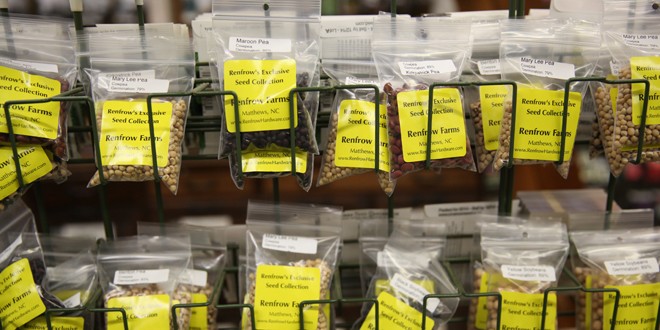To view a PDF of this story, click here.
Up-and-Coming Categories Catching Consumer Interest
By Kate Klein, kklein@nrha.org and Sara Logel slogel@nrha.org
Home improvement retailing is as competitive as it’s ever been, and successful retailers are developing strong niches and establishing themselves as resources for new and unique products.
Those niches are chosen based on markets and trends, and can range from carrying a broader selection of fasteners than the big boxes to stocking highly specialized parts for commercial pruning shears. The opportunities for unique niches in the home improvement industry are expansive. But how do you choose what’s right for your market and which niches are poised to grow in the coming months?
To give readers some insight into some of the more popular emerging niche areas, Hardware Retailing worked with the National Hardware Show® to identify product categories that offer independent home improvement retailers unique growth opportunities.
Finding Your Niche
Buying markets and trade shows offer some of the best opportunities for retailers to look for new products in the niches they already sell well, and also to learn about emerging categories they might not offer.
The largest gathering of home improvement retailers in the world, the National Hardware Show, is a resource for helping retailers recognize up-andcoming, growing niche categories so they can stock the products necessary for staying in line with or anticipating the needs and interests of consumers.
Our editors worked together with representatives from the National Hardware Show to identify the trending niches you will find on the following pages. Not all of these niches will be popular in every market or for every store type, but retailers should continually be looking for what will work for them.
1. Urban Farming
Many consumers don’t want to buy fresh and organic food from grocery stores; they want to raise it in their backyards. Growing consumer awareness of where food comes from and health risks associated with store-bought groceries has motivated many people to take food production into their own hands. This motivation has led to urban farming becoming a growing niche.
Now urban dwellers raise chickens, rabbits, goats and other animals in their backyards, depending on rules in the cities where they live.
“If you walk around any residential area in Seattle, there are chicken coops,” Michael Radice, owner of Greenwood Hardware in Seattle, says.
Noticing this trend led Radice to add chicks to his inventory last year.
“All day long, there are people coming in, mothers with younger children, kids after school. They are a big attraction,” he says.
Andrea Ridout, managing partner of Gecko Hardware in Dallas, opened her store about two years ago. Ridout previously hosted a radio show for Mother Earth News magazine and thought, “Wouldn’t it be cool to have a store where all of these products can be found in one spot?”
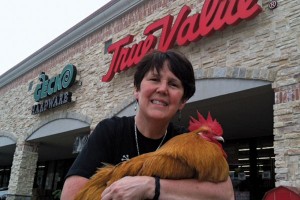
This reflection inspired Ridout to start Gecko Hardware, which is a traditional hardware store with an urban homesteading and garden center for consumers looking to live an eco-friendly lifestyle. Gecko Hardware has since won awards for its urban farming assortments. Ridout sells chicks at her store and has a pet rooster named George whose photos are incorporated into promotional material and on Facebook.
“The chickens have done great,” Ridout says. Her first round of 60 chicks sold in two weeks. Then she ordered an extra 200 that sold out quickly.
“Before we even ordered our first batch of chicks, I called my friends who owned farms to make sure if I didn’t sell them, I could send them to their farms. But now we haven’t been open for two years, and I’m estimating we’ve sold more than 4,000,” Ridout says.
About 70 percent of Gecko Hardware’s chicken buyers are young couples looking to add coops in their backyards, and about 30 percent of buyers are over the age of 40, she says.
Greenwood Hardware sells two kinds of chicks, Ameraucanas and Rhode Island Reds. Radice says that while chickens don’t provide high-profit margins, they do draw plenty of customer attention.
“Customers have come in the last month saying, ‘When are you getting in the chickens?’” he says.
David Blackley, owner of Renfrow Hardware & General Merchandise in Matthews, North Carolina, has sold chickens since the 1980s. He’s noticed their recent increase in popularity and also that different demographics raise poultry than 30 years ago. They’re mostly young homeowners, he says.
Renfrow Hardware shows customers how to raise backyard poultry with a pen set up on the side of the store that houses a rooster and three hens. “It’s educated many, many people on how to have them in the backyard,” Blackley says.
The attention the animals attract helps the store sell other products. “We are one of two stores selling chicken feed, and we are selling over a pallet of chicken feed a month,” Radice says. Chickens have become popular all over the country, but before adding them to your selection, educate yourself and talk with your distributor about how to get started.
“You can’t decide to get chicks without doing some research and understanding the breeds,” Ridout says. “We’ve learned a lot the past two years.”
Gecko Hardware hosts a variety of classes and events to promote different product categories. Recently, the store planned an event with local 4-H members to offer $20 claw and wing clipping and beak trimming for chickens.
2. Organic Gardening
Organic gardening is part of a growing movement among consumers who want to know that their food hasn’t been treated with chemicals, is unprocessed and is as healthy as possible for the environment where it’s grown and for the bodies of the people who eat it.
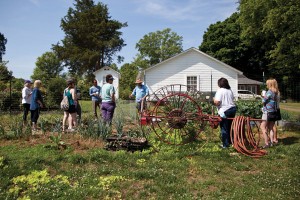
“There’s kind of a renaissance in home gardening and homesteading,” Eric Hassett, president of Hassett Hardware in Half Moon Bay, California, says.
Reasons for the renaissance include baby boomers retiring and taking up gardening as a hobby, but also younger people getting interested in the health and environmental benefits of using natural products, he says.
The main buyers of organic products at Renfrow Hardware are young families, Blackley says.
“It’s very much a health-conscious crowd. They want to grow something in their backyard, even if it’s just a little bit,” he says.
Ridout has noticed a distinct shift in consumers wanting more natural gardening practices, and TV shows and magazines have reinforced the trend, she says.
Many people no longer want to rely on corporate farming for food, and are interested in sustainable practices, says Mike Kelley, co-owner of Maple Leaf Ace Hardware in Seattle. The store he owns with his wife, Kathy Stephenson, sells organic vegetable seeds, peat pellets, organic soils and fertilizers and insecticidal soaps that kill pests on plants more naturally than chemicals.
Kelley has expanded his organic product category within the past three years in response to customer requests, noticing “a definite bump in the trend,” he says. Buying organic products is part of a values system his customers embrace.
“They’re in control of what they grow and what they eat. It sort of enriches them. It’s good for the soul,” Kelley says. “It’s part of empowerment. They can do it themselves.”
Consumers are also interested in knowing which organic soil amendments are best for growing specific plants, so they’ll buy a group of products for treating their lawns and other items for growing azaleas, Hassett says. His stores sell products for organic gardening, such as nontoxic citrus weed killer, fabric weed blocker and mechanical weeding tools. Nontoxic weed control requires more products than chemical killers.
“Organic offers a better solution for customer problems, but also for the store,” he says.
Hassett Hardware stores also sell live earthworms to add to gardens to improve soil quality, as well as beneficial nematodes, ladybugs and praying mantis egg sacs for natural pest control. Renfrow Hardware also does well with live products such as composting bugs, worms and crickets.
Ladybugs kill insect pests on roses and other decorative plants, and praying mantises and beneficial nematodes kill grubs and other garden pests, Hassett says.
Live pest control needs to be replenished, so Hassett has a constant market for the little pestkilling creatures he sells.
Blackley has grown his organic gardening customer base by using a vacant lot next to the store for a growers-only farmers market. Farmers use the land for free and attract shoppers on Saturdays. The arrangement is mutually beneficial.
“Those are the same customers that will walk right up the street and buy tomato plants, vegetables and insecticide from us,” Blackley says.
Renfrow Hardware also hosts monthly classes and provides gardening information on its websites.
“We’ve been successful at trying to teach people, and then you make a friend out of them,” Blackley says.
3. Rainwater Management
Another emerging niche, which retailers see as a potential product growth area, is rainwater management. Category products include water-conserving drip sprinkler systems and barrels for collecting rainwater.
Droughts and interest in green, cost-efficient products have spurred consumer interest in the niche.
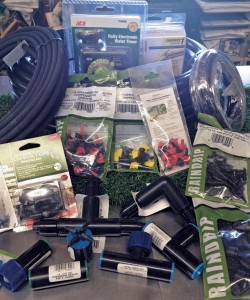
For example, this year in Avenal, California, residents will likely be banned from watering their yards because of drought conditions, resulting in the need to conserve water, Ron Moran, owner of Avenal Lumber & Hardware, says. Residents will be required to limit their water usage every day, so they’re looking for products to help reduce their water consumption.
Moran is stocking the market’s most efficient drip irrigation systems, which emit small droplets of water rather than a shower-like spray. He’s also selling micro sprinklers, small devices installed close to specific plants to mist them with water.
Consumers may have to paint their yards green because their grass dies, but they can keep their flowers, shrubs and trees alive with conservative watering, Moran says.
Other consumers are interested in collecting and reusing rainwater to water their gardens, so they’re buying water collection barrels from stores such as Gecko Hardware and Hassett Hardware.
Due to the California drought and ongoing interest in water conservation, Eric Hassett is planning to launch a technology-based sprinkler control program this summer. The program would include sprinkler systems that are connected to Wi-Fi and an app calculator for customers to track the weather and figure out how many minutes per day they need to water their plants. The program could potentially help customers decide how long to run their sprinkler systems based on calculations that consider the specific needs of plant varieties and soil types.
Maple Leaf Ace Hardware special orders rain barrels when customers request them, but more often sells timer systems to control sprinklers and drip lines. “The price of water is going up. Nobody wants to waste it,” Kelley says.
4. Emergency Preparedness
Due to technological advances and recent extreme weather, emergency preparedness is also a growing product category.
Yet, stocking products for emergency preparedness can be tricky, since customers tend to rush out to buy large quantities of D batteries, first-aid kits, weather radios, lanterns and emergency candles when there’s already a power outage.
“You’re keeping inventory in anticipation of an event, and that’s an issue,” Vincent Christofora, owner of Woodstock Hardware in Woodstock, New York, says. That means keeping product in stock that might only sell a few times per year.
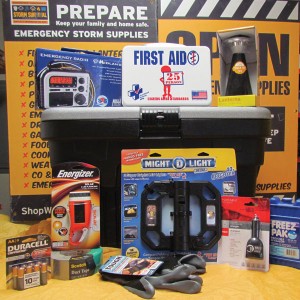
Major storms within the past five years, such as hurricanes Sandy and Irene, deadly tornadoes and record snowfall in sections of the U.S. have brought attention to the emergency preparedness category, and manufacturers are creating emergency products to meet the needs of an increasingly technology-dependent population.
Newer products include solar-powered flashlights and cellphone chargers, which Hassett Hardware sells, and kits for living in cars for several days at a time.
Woodstock Hardware and Hassett Hardware both stock emergency supplies year-round— beyond the basics from other categories that they recommend for emergency preparedness, such as batteries, hammers and flashlights.
New York gets the high winds and heavy rains following hurricanes in other parts of the country, and Hassett’s California customers run out and buy emergency supplies when there’s an earthquake.
Christofora has tried to advertise his emergency products year-round but has since stopped. Instead, he provides checklists of emergency products on his store website and perpetually stocks pallets of batteries and emergency kits as a public service, rather than as everyday top sellers.
“We’ve identified the key items, and we’ve got a lot of merchandise. We’ve got this whole thing that really lies and waits for an emergency,” Christofora says.
When a major storm hits, his store immediately sells out of batteries and other emergency items, regardless of how much product he had in stock—and, often, he ends up sending trucks to his distributor’s nearest warehouse to restock, while customers anxiously wait.
Hassett’s stores stock small disaster preparedness sections, and twice a year put together displays on endcaps with emergency products from across departments. Those products can include sleeping bags, hand-cranked radios, flashlights, solar phone chargers and emergency backpacks, which come preloaded with supplies such as blankets, tools, food and water rations.
At the anniversaries of major earthquakes, local media emphasizes the need to be ready at all times, Hassett says. On those days, Hassett employees focus on asking customers if they have emergency supplies together in one place if they needed to flee due to a house fire or earthquake. Many people don’t think about having to keep hammers and flashlights together to grab quickly. They assume they’re prepared because they already own tools, but then an earthquake hits and their supplies are buried in drawers or batteries are dead, Hassett says.
“Consumers are very complacent,” he says. “We tend to keep a heavy stock. When it does sell, it’s just nonstop.”
5. Portable Grills
Grilling on holidays, around the pool, at ball games and on warm summer evenings is an American tradition. And about 80 percent of U.S. households own an outdoor grill or smoker, according to the Hearth, Patio & Barbecue Association.
Since there are a wide variety of grillers across the country, ranging from first-time grill users to barbecue competitors, there is also a broad range of grills on the market.
Small portable grills have been gaining traction lately as new products and wider assortments are made available. This subcategory of grills has taken off as a separate niche, with manufacturers and retailers expanding the category.
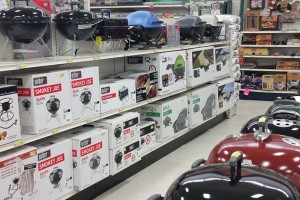
In 2013, 63 percent of respondents to Tailgater Magazine’s 2013 grill survey owned a portable gas grill, and 46 percent owned a portable charcoal grill. Demand observed by retailers indicates the number of portable grill owners has only gone up since then.
A growing number of consumers recognize the versatility of portable grills, and they use them to cook food while camping, during power outages due to severe weather and while tailgating at outdoor concerts or sporting events.
Companies now offer the portable models in a variety of colors and styles, and consumers can choose from an array of shapes and trendy hues.
Retailers are expanding their offerings, and customers now can choose portable gas, electric, charcoal and pellet grills.
Gecko Hardware carries grills of various sizes from a variety of brands, including its distributor’s brand, Ridout says. She is also working on stocking hibachi grills, which are already attracting attention at the store.
“I bought a show sample at my distributor’s show, and we’re waiting on a pallet for it, but I could’ve sold that sample 10 times over already,” she says.
Ridout notes that some customers use the portable grills when they’re camping, but the majority of the buyers she sees live in apartments, where full-sized grills are not allowed.
“I think they’re awesome—just as good as the big grills,” she says.
Martens Reedsburg True Value Hardware Store in Reedsburg, Wisconsin, also has a wide assortment of grills. In just the past couple of years, though, the store has expanded its offering with more new styles.
“We do tremendously well in the entire category,” lawn and garden department manager Gabe Pierce says.
The store stocks about 12 to 15 portable gas grills, about a dozen charcoal portable grills and two electric portable grills. Pierce affirms that apartment dwellers are her most frequent buyers of portable grills.
“They all sell really well, be it gas or charcoal,” Pierce says.
 Hardware Retailing The Industry's Source for Insights and Information
Hardware Retailing The Industry's Source for Insights and Information



